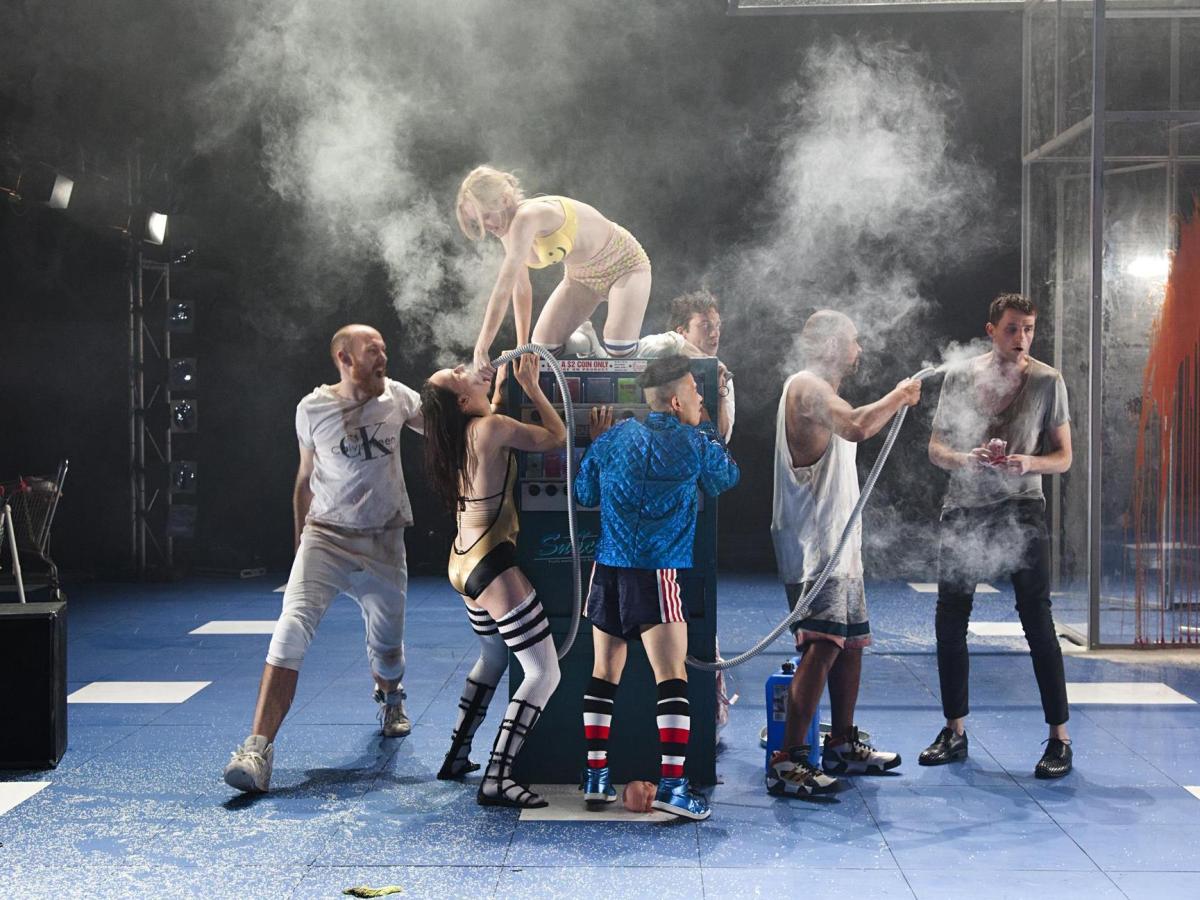Image by Pia Johnson.
The Good Person of Szechuan (produced by Malthouse Theatre and National Theatre of China) provocatively restages Bertolt Brecht’s morality play where questions of goodness in the face of guile and exploitation are expounded in favour of the latter.
Set in the Chinese province of Szechuan, a composite of Brecht’s mythological imaginings and the celebrated Chinese director Meng Jinghui’s (Rhinoceros in Love) projections of a restless and seething international city, three exalted gods (Genevieve Morris, Emily Milledge, Genevieve Giuffre) descend on the city seeking a good person in what has become a destructive, faithless world. Guided through the rejected, urban squalor by Wang the water-seller (Richard Pyros), the gods find shelter with Shen Te (Moira Finucane), a sympathetic prostitute whose unexpected good fortune –the god’s bestow her 10 000 silver dollars – is marshaled in an attempt to ‘stay good’ through the purchase of a tobacco shop. The kind-hearted Shen Te is immediately set on by the avaricious and malevolent citizens of Szechuan who threaten to destroy, if not altogether consume the shop, forcing Shen Te to invent her male cousin-protector, and Shen Te’s doppelgänger, Shui Ta (Finucane).
Jinghui’s dramatic rendering opens with Wang masturbating amid the urban detritus, taking to new theatrical heights the paroxysm of the self-destructing world Brecht envisaged when he conceived of the play in 1938 (completed in exile in 1943). Brecht’s Chinese province renders a mythology of ‘place’ – exposing ideas of territory and its citizens as an accumulation of effects and desires. For director Jinghui and script writer Tom Wright, Szechuan is transposed into a nightmare world of suffering and consumption gone awry, comprised of heroin addiction and its attendant corruption and mercenary exploitation of the ‘good’. As with the masturbating waterman, this adaptation suggests consumption has turned in on itself. Supermarket trolleys are attached with heroin-filled dolls, as characters traipse make-believe aisles making onerous claims on, and take root in, Shen Te’s shop; and the gods descend in a glass lift, resplendent in white wedding gowns laden with shopping bags. The mandarin surtitles [or supertitles], too, on the otherwise operatic stage, serve as easy projections western culture makes of Asian cultures, particularly as they display lyrics – karaoke like – in English in musical numbers.
The dramaturgical impulses share in Brechtian elements: actors are on stage before and after the ‘performance’; the stage is gutted to its most elemental; and the characters, particularly Sun (Daniel Frederiksen), the suicidal pilot who emotionally and financially exploits the soft-hearted Shen Te, directly challenge the audience to create meaning. In an hilarious musical number, ‘it’s never gonna happen’, Sun turns on the audience in mock surprise as if to deride the romance narrative – and narrational – expectation.
These techniques, however, are almost tongue-in-cheek to a post-modern audience, and serve in humour for the Brecht-savvy, as the injured pilot drags his wounded leg, then shifts legs as if forgotten in performance.
Yet Jinghui’s staging – and casting – is strong. The ensemble cast perform with a complicated coherence – notably Burt Labonte’s effortless turns as Szechuan’s policeman and Yung’s father, Emily Milledge’s arresting wife and Frederiksen’s exceptional Yang Sun. Where Shen Te’s love saves the unemployed suicidal pilot, it fails to render him ‘good’ as he mercilessly exploits her and ends up carrying his baby. Sun delivers a biting exposé of the notion that ‘Being in love is the perfect state for humans’ synthesizing the romance narrative into a woman neglected, given attention.
There is a certain queering of the text too – the invention of the male cousin as protector suggests some interrogation of gender and sexuality and is nuanced by Moira Finucane’s performance – ‘I can play the zither and I’m really good at imitating men’. Finucane’s physicality is impeccable; her transformation into her male cousin, Shua Tai, a figure imagined to protect the ever-giving Shen Te from further exploitation, is effortless, performance art in itself, with the impeccable study of affectation and gesture. Yet, it is the latter which Finucane is perhaps more comfortable; leaving the coolly contained ‘good woman’ without the weight the script demands.
The play is not without strain – as is Brecht’s want. The continuous two-hour performance is in part somewhat forgettable. The adaptation, too, is faithful in terms of Brecht’s abrupt ending that leaves the audience to determine Shen Te’s fate. But what is memorable in this hybrid Chinese-Australian co-production of Brecht’s fable of a person who is good yet open to exploitation, is in the moebius-like strip of translation – the endless traversing between cultures, languages, imagery and imaginings.
Rating: 3 ½ out of 5 stars
The Good Person of Szechuan
Created by: Malthouse Theatre and National Theatre of China
By Bertolt Brecht
Direction: Meng Jinghui
New translation: Tom Wright
Cast: Aljin Abella, Moira Finucane, Daniel Frederiksen, Genevieve Guiffre, Bert LaBonté, Emily Milledge, Genevieve Morris, Josh Price, Richard Pyros
Merlyn Theatre, Malthouse Theatre, Southbank
www.malthousetheatre.com.au
27 June – 20 July





